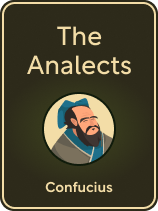

This article is an excerpt from the Shortform book guide to "The Analects" by Confucius. Shortform has the world's best summaries and analyses of books you should be reading.
Like this article? Sign up for a free trial here.
How well do you know what Confucius taught? What did he actually say?
Confucius is one of the most famous philosophers in history. The Analects is a collection of his teachings compiled by his most devoted students, and it’s one of the foundational books of Confucianism. In it, you’ll find lessons about how to be a good learner, person, and leader.
Keep reading for several The Analects quotes that shine a light on Confucianism.
The Analects Quotes
Confucius lived from 551 to 479 BC, during the Chinese Zhou dynasty. He was a renowned teacher and government advisor. His teachings formed the basis of Confucianism, one of the most prominent philosophies in China and one that’s still widely studied today.
We’ve collected five The Analects quotes and provided them along with some context and explanation to help you grasp Confucius’s ideas.
“Hold faithfulness and sincerity as first principles.”
Confucius teaches that honesty is a key part of proper conduct—a good person must be trustworthy. When Confucius discusses honesty, he doesn’t just mean not telling lies. You should also try to be honest in your thoughts. In other words, avoid unfair biases; strive to see people, things, and situations as they are instead of as you expect (or want) them to be.
Honesty also means being frank about your skills and knowledge: Don’t inflate your abilities, but don’t sell yourself short, either. In short, know your own worth and be honest about it.
Finally, Confucius says that an honest person must avoid hypocrisy. He suggests that you ask yourself at the end of each day whether you gave any advice that you don’t personally follow. If so, change either your actions or your teachings so that you can avoid such hypocrisy in the future.
“To be wealthy and honored in an unjust society is a disgrace.”
Since Confucius defines a good person as someone who strives to improve the world, he believes that good people must be altruistic: They act to help others rather than for personal gain. Confucius describes this using the Chinese word ren, translated as “humaneness” or “humanity.” For him, ren means always striving to live up to the moral standards he sets throughout the Analects, no matter what. He says that good people would rather die than compromise their morals.
Frugality is an important aspect of altruism. Since altruism is the opposite of selfishness, altruistic people try not to take more than they need. They’re happy to live modestly, with a small home and simple food. Confucius says obsessing over material goods when you already have enough to live on is a waste of energy that would be better spent helping others.
“Tsze-Kung asked, ‘Is there one word with which to act in accordance throughout a lifetime?’ The Master said, ‘Is not reciprocity such a word? What you do not want done to yourself, do not do to others.’”
Confucius generally encourages students to think and learn for themselves, but he offers more direct advice about morality. He says that a single word can guide everything you do: the Chinese word shu, which means don’t do to others what you wouldn’t want to be done to you.
(Shortform note: Shu seems to be a fairly straightforward concept, but there’s debate about how to translate the word itself. Some scholars say that it means self-reflection—you imagine yourself in others’ positions, “reflecting” yourself onto them and thereby developing empathy. Others translate it as reciprocity, saying that shu refers to the relationship between yourself and others; if you treat others well then they will treat you well, and if you treat them poorly then they’ll treat you poorly. Other translations of shu include respect, deference, and altruism.)
“Learning without thinking is useless. Thinking without learning is dangerous.”
Confucius wanted people to observe, learn, and discover their own solutions to problems. Therefore, in his role as a teacher, he rarely gave his students the answers to their questions. He would instead provide a hint and insist that they figure out the rest themselves. He’d urge them to consider every question, even simple ones, from all possible angles. Using this method, Confucius didn’t teach people what to think, but rather how to think.
(Shortform note: The methods Confucius describes here are commonly known as active learning—when students think about what they’re learning through questioning and other methods instead of just memorizing answers and repeating them on command. Today, active learning is widely considered to be more effective (and more enjoyable) than rote memorization as it boosts student engagement and information retention. It also supports students’ true understanding of the subject matter.)
“I used to take on trust a man’s deeds after having listened to his words. Now having listened to a man’s words I go on to observe his deeds.”
In addition to observing your surroundings and thinking about your tasks, Confucius urges you to learn whatever you can from other people. One way to do this is through open-minded observation: When you’re with others, observe their good qualities (such as humility, honesty, or generosity) and try to emulate them. At the same time, look for bad qualities (such as pride, selfishness, or cruelty) and try to correct those faults in yourself.
You can evaluate people by closely observing their good and bad qualities. Confucius specifically recommends judging people’s actions rather than their words. It’s easy for people to say the right things and pretend that they have strong moral character, but much more difficult for them to actually do the right things.
Exercise: Reflect on Confucianism
Take some time to think about what you’ve read and consider how Confucianism might help you improve yourself or your life.
- What did you already know about Confucius and Confucianism before reading this?
- What quotes did you find the most surprising, motivating, or interesting? Why?
- What’s one piece of advice from Confucius that you could implement in your daily life, starting right now? (For example, you might strive to be more observant, to ask for guidance when you make a mistake, or to live more frugally.)

———End of Preview———
Like what you just read? Read the rest of the world's best book summary and analysis of Confucius's "The Analects" at Shortform.
Here's what you'll find in our full The Analects summary:
- A collection of Confucius's teachings compiled by his students
- Lessons about how to be a good learner, person, and leader
- Concrete methods for putting Confucius’s teachings into practice






